Backpacking is defined as low cost, independent travel. Backpacking in Iran is defined as extremely low cost, intrepid adventure with everything from modern art galleries to 4,000 year old archaeological sites. In this post, I give you the scoop on a backpack’s guide to Iran (on a budget!).
Getting to Iran
Most Middle Eastern and Turkish Airlines will fly from Europe to Iran. There are a few direct flights with Iranian airlines, but these can be difficult to find.
Best time to travel to Iran
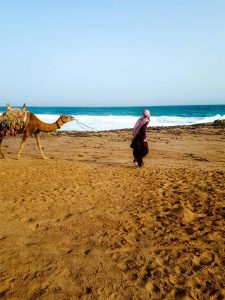
Charbahar in the Persian Gulf
In my opinion, the best time to travel is between May and September. Although Iran experiences hot summers the whole country comes alive during the warmer months. Locals stay out late, shops are open longer and the cities are green.
In saying this, winter has its benefits too. In winter you can have a ski/dive holiday! The ski slopes in the Alborz Mountains close to Tehran offer world-class skiing, at the fraction of the price. Travelers can then head south to the Persian Gulf Islands for scuba diving, sun, and sea.
Iran Visa
All incoming tourists to Iran will need to obtain a tourist visa. Usually granted for a period of 30 days (which can be extended up to 90 days) the tourist visa is the first thing to consider for planning your trip.
Iran visa on arrival is issued at some Iranian airports (such at Tehran’s Imam Khomeini International Airport) or visitors can apply in advance for a visa through a provider such as 1stQuest. Backpackers coming across the country should know that visas on arrival are not available at land borders.
Applying for Iran visa in advance reduces your risk of rejection and disappointment. From as little as 19 EUR, 1stQuest will handle your visa application for you.
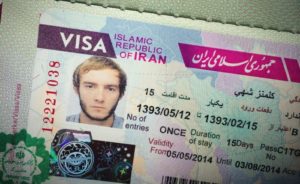
Iran tourist visa is best obtained in advance
Budgeting for Iran
Iran is a very inexpensive travel destination. Last year the Iranian Rial tumbled 400% against the US dollar due to the reimposition of sanctions. The good news is, Iran’s tourism industry is booming as budget travellers are discovering Iran’s potential as a holiday hot spot.
To be on the safe side, the budget traveller should allow a minimum of 25 EUR per day. Your main costs will be accommodation, followed by food and then transport and entrance fees.
Iran is not very well connected to international banking systems so it is virtually impossible to find an ATM that will accept an international card. This means you will need to bring cash. 1stQuest offer travellers an Iranian debit card that can be charged with EUR or USD. Any left over cash you have on the card will be returned to you in the currency of your choice. For more information on obtaining an Iranian debit card, contact 1stQuest Support Team.
What to pack
Always a tricky question when backpacking! In my personal experience, a notebook is vital for Iran. Friendly locals will want to give you tips, draw you maps, pass on their email, etc.
Clothing is worth discussing. My advice is to go for loose, comfortable, modest clothing. Due to Islamic law and customs, women are required to wear hijab and men must wear long pants. For more info, read the dress code post. All across Iran you will find ample water fountains. Water fountains in train stations, on the street, in parks, in shops – everywhere! So bring a water bottle to take advantage of the free water!
You will encounter much random act of kindness from Iranians during your trip. On my first trip, I wished I had a stock of tiny souvenirs from my home country to give to the people who showed me kindness. Lastly, but certainly not least, don’t forget to come with an open mind.
Where to go in Iran
This really depends on the length of your trip. Places that cannot be missed are Isfahan and Shiraz. Isfahan is Iran’s former capital and has more iconic sites than you can poke a stick at! Shiraz has all the beautiful charm of old-world Iran and the ruins of Persepolis are only a 1-hour drive away. You can book a Persepolis tour and other experiences via 1stQuest.
Most flights will fly into Tehran, Iran’s sprawling capital, however, most tourists decide no
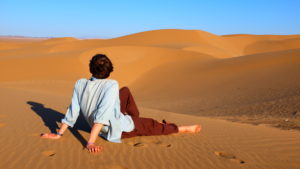
Iran’s Maranjab Desert near Kashan
t to stay long in Tehran’s hustle and bustle. You can pre-arrange your airport transfers with 1stQuest pickup transfer service.
Other popular destinations are Kashan and Yazd. Both desert cities, travellers can easily take a day trip or spend a night in the desert from these cities. The north and south of Iran have a totally different vibe to the central provinces. Both bordered by sea, the north is forested and mountainous whereas the south is all about sandy beaches and fishing villages. For more information on Iran’s lesser-known destinations, check out this guide: less known destinations in Iran
Where to stay in Iran
Accommodation will probably be your biggest expense. Booking ahead of time can save money and help budget travellers find the best deals. More than 300 Iran hotels are listed on 1stQuest’s online booking platform.
Tehran Heritage Hostel is a great place to crash when you arrive or the night before you fly out. Located in downtown Tehran, Tehran Heritage Hotel is well connected to public transport and is within walking distance of museums, palaces and the Grand Bazaar. Restored and opened as a hostel in 2018, the rooms and facilities are clean and fresh. With dorms starting from 6 EUR, you can’t really go wrong. For other budget hotels in Tehran, check out this article: Tehran hostels.
Isfahan’s Mahbibi Hostel is located just north of the Zayandeh Roud River in central Isfahan. All rooms are air-conditioned and include breakfast for as little as 7 EUR. The hostel offers guests morning yoga and an onsite café/restaurant.
For a complete budget travel guide, check out this article: budget hotels in Iran.
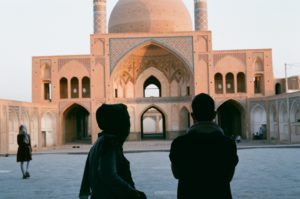
Iranian Mosque, Photo by Alison Lovell
To Couchsurf or not to Couchsurf
Many budget travellers opt for Couchsurfing when considering accommodation. Although there is an active Couchsurfing community in Iran, travelers do not always have positive experiences. Due to Islamic law, Couchsurfing is technically illegal in Iran and stories of police raids are not uncommon (note: police would not prosecute tourists, rather their Iranian hosts). Couchsurfing is a fantastic way to meet locals, but we recommend a coffee date, not an overnight stay.
Iran and safety
Iran is a really safe place for foreign travellers. Locals will invariably greet tourists with kindness and generosity. Iran has often dubbed the safest place to travel in the Middle East with low violent crime rates, relatively stable politics, and low terrorist activity. Read this post for more information on Iran safety.
How to get around
In the cities you can use the public transport systems (metro and buses) at a very low cost. Tickets are easy to buy and all ticket attendants speak a little English. Sometimes public transport will not be available. Taxis or ride share are a good alternative. Snapp and Tap30 are Iran’s biggest ride share applications and are available for download in English.
For intercity travel, the cheapest and most efficient form of budget transport is bus. Iran’s intercity bus system is extremely comprehensive and prices start from just a few euros. You can book buses online with 1stQuest. Domestic flights within Iran are also available for the budget traveller. Iran is a big country so flying might seem like the best option when faced with a 12-hour bus ride! Check out Iran’s domestic flights.
How to save money in Iran
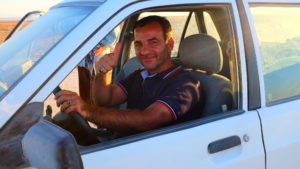
Iranian taxi drivers drive a hard bargain but they sure are friendly
Booking your hotels, transfers, and flights in advance will invariably save you money. Although bus tickets will not go up in price, buying in advance will give you peace of mind.
To avoid nasty surprises, you should always ask for a price before you commit. For example, agree on a price for the taxi before you get in. Also, if a restaurant does not have prices on the menu, be sure to confirm the cost before you order!
Due to their place on the Silk Road, Iranians for thousands of years have been professional salespeople and merchants. Bargaining is expected and tourists should attempt to lower the price before buying.
